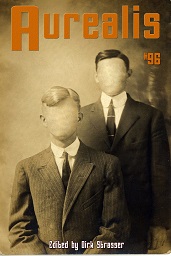“Obsidian River” by Annika Howells
Reviewed by Kat Day
This issue of Aurealis begins with “Obsidian River” by Annika Howells. We find ourselves in a car at the start of the story, and some lovely description sets a dark and creepy scene. It’s not long before our driver, whose name we learn is Marilyn, picks up a mysterious hitchhiker called Ethan. Clearly this is no straightforward Sunday drive in the country, and as the story unfolds the true unreality of the situation becomes increasingly clear. The idea upon which the story hangs is not, it must be said, at all original. I’m fairly sure I’ve read at least one version of this tale in a Stephen King anthology. That aside, though, this is a well-executed piece of work which makes clever use of evocative language, and Howells’ writing allows us to empathize with Marilyn’s desperation and confusion. If you’re a horror fan, you’ve almost certainly read something like this before but nevertheless, it’s worth going along for the ride.
In “Searching for Cidalisa,” by S G Larner, we find Ellie dreaming about databases. You know how writers are always advised to start in the middle of the action? This starts with talk of proximity operators and Boolean queries. We learn that Ellie is searching for her lost lover, Cila, who “went missing in 2027.” So, this is a near-future tale of a world in which “Goo” (hmmm…) has taken over and everyone has an “earLink” (geddit? geddit?) implanted in their earlobe connecting them to everything. There’s some more database chat, and then Ellie has a dream and decides to head off to Mexico in search of Cila. Some inexplicable bad stuff happens, and then she comes back. Oh, and at the risk of spoilers, the bad guys turn out to be another large corporation who’ve, until then, only been mentioned once or twice in passing. Their name is not, incidentally, disguised even slightly, and one particularly outrageous claim is made about their practices. Let’s hope their lawyers aren’t SF short fiction fans, eh? It’s safe to say that the themes here are Not Subtle. Indeed, this is 27-foot, pink, flashing, neon sign levels of unsubtle. It could work, it might even be quite entertaining, if there were even the smallest hint that Larner’s tongue were in her cheek, but no, this is played absolutely straight. Indeed, the author even admits in the blurb at the end that she wrote the story after she learned about Information Retrieval in her first semester of a Masters in Information Science, and that its themes came out of her nervousness at Google’s (oh, THAT’S who it was!) “creepy trajectory.” I suppose this might appeal to a certain type of reader, but I found myself rolling my eyes so hard I think I actually saw my own brain.
“Extracts from a Life of Science Fiction,” by Patrick Doerksen is set somewhere in the Far East, in the vicinity of Japan. We follow the story of a boy living with his parents, above their grocery store. It appears that some sort of alien species has landed, and been named (the) exochthon. Nowhere is this name explained, but I assume it’s a reference to the deities of the underworld in Greek mythology, with “exo” added to describe a species from beyond Earth. The aliens create something called exopits, but it’s not obvious whether these are craters from weapon blasts, or mines or some other thing. They’re definitely not fun places to visit, though. The boy gets older and becomes a writer. His work gets rejected, of course. There’s some talk about a mysterious character called the Master, who seems to be human (our protagonist obtains his signature at one point), but again this isn’t explained. And then our hero applies to be a research subject for the Japanese military. Eventually, after the aliens leaves, he finds success – at least in one area of his life. There are some good Japanese-post-nuclear-monster references here, and the age-old theme that the monsters are inside, not outside. But I’m afraid I found the constant lack of explanation and description confusing and exhausting, and as a result couldn’t empathize with the solipsistic central character.
Kat Day writes the award-winning, non-fiction science blog The Chronicle Flask, which you can find at chronicleflask.com. She also has a fiction blog, at thefictionphial.wordpress.com.
 Aurealis
Aurealis